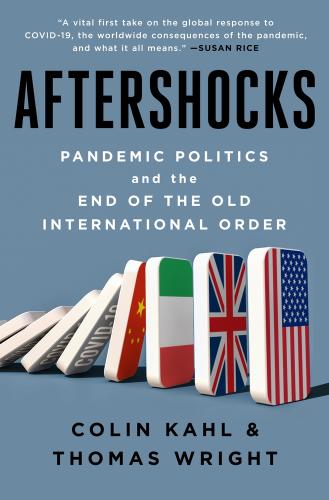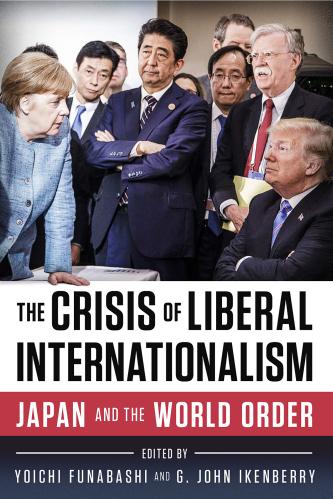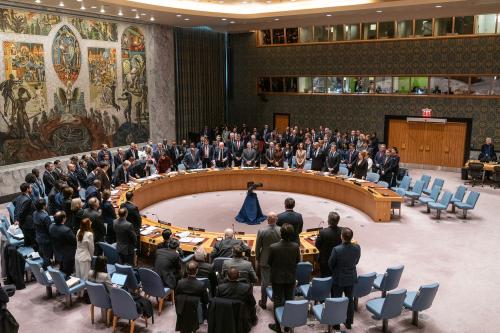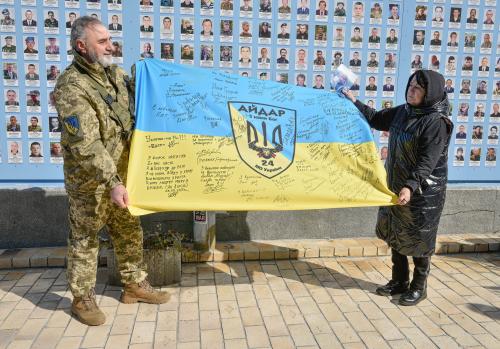This essay has been adapted from a keynote address that was delivered at Brookings’s ninth annual Justice Stephen Breyer Lecture on International Law on March 30, 2023, at Johns Hopkins University’s School of Advanced International Studies (SAIS).
Cast your minds back to just over a year ago. On February 24, 2022, Russian President Vladimir Putin launched the largest ground war in Europe since the end of World War II. At the time, the situation looked bleak. Many believed that Ukraine had little hope to hold out in the face of a full-out assault by its much larger, better-armed neighbor. Russia’s military far exceeded Ukraine’s: It had nearly five times the number of active military personnel, almost five times the number of armored fighting vehicles, and ten times the number of aircraft. Overall, it spent roughly ten times the amount on its military annually. Perhaps most important, Russia possessed the largest nuclear arsenal on the planet, and it was clear that no state, not even the United States, was prepared to engage it in open warfare as a result. To top it off, Russia held one of the permanent five seats on the United Nations Security Council, which gave it a veto over any enforcement actions that the U.N. might undertake. If there was ever a case where law would capitulate to power, this was it. Indeed, as the war began, it looked like we were witnessing the end of the modern global legal order.
And yet the worst has not come to pass. On the eve of the war, Putin predicted that his “Special Military Operation” would take mere days, and yet here we are more than a year later with the Ukrainian government retaining control over the vast majority of the country. Many of the gains Russia made early in the war have been reversed. And the international system has proven imperfect but robust.
Today, I will consider what the war has taught us about the strengths and weaknesses of the international legal order.
What is at Stake: The Prohibition on War
When Russia launched its aggressive war against Ukraine, it violated the prohibition on the use of force embodied in Article 2(4) of the United Nations Charter. Scott Shapiro and I argued in our book, “The Internationalists,” that this principle is the fundamental underlying international legal principle of the modern era. War, we argued, used to be perfectly legal and legitimate. Indeed, war was a key way in which states resolved their disputes with one another. International law not only did not prohibit war, but it relied on war to enforce its rules. That changed first with the 1928 Kellogg-Briand Pact, which for the first time outlawed war and set in motion a range of legal transformations.
That transformation was reaffirmed in the U.N. Charter at the close of World War II in 1945. The prohibition on the use of force embodied in Article 2(4) of the charter is not just one legal principle; it is the key legal principle on which the rest of the system relies.
When Putin launched his war, he put that underlying principle at risk. But the test of a legal rule — whether domestic or international — is not determined simply by whether it is violated. It is determined, too, by the response when it is violated. We would never say that, for example, there is no value in laws prohibiting theft because theft still takes place. We would point to the fact that when people who steal are caught, there are legal consequences. Those consequences not only aim to punish the person responsible but they are also intended to deter others from engaging in violations in the future.
So, to see whether the law remains effective, we have to look not just at whether Russia violated the law — which it clearly did — but at the consequences that Russia has faced for that illegal war.
But first let me address at the outset a possible source of skepticism: One might reasonably ask whether the prohibition on force had been so eroded even before Russia launched its war in Ukraine that it had become a fiction. No doubt there is some evidence for this claim — not least the United States’ illegal invasion of Iraq in 2003 and its use of force under the controversial “unable and unwilling” theory of self-defense. These actions have been deeply corrosive to the international legal order, and I do not mean to ignore or discount them. Indeed, I have been consistently critical of them for my entire career.
One can recognize these violations have taken place and nonetheless believe that the world of the postwar era is remarkably different than the world that existed when war was perfectly legal and legitimate. Then, states could go to war to settle any complaint or dispute — and they did. They could engage in the conquest of territory and that conquest was generally unquestioningly accepted by all other states. Indeed, from 1816 through 1928, around 250,000 square kilometers of territory were conquered on average every year. Moreover, gunboat diplomacy — in which states were forced into treaties and other arrangements they did not desire — was part of the ordinary course of business.
While we can point to cases where the prohibition on war has not been observed — and the United States has been both one of the greatest defenders and one of the greatest offenders in the last several decades — it’s a mistake to suggest that the legal principles are meaningless or ineffective. The modern legal order is grounded in the prohibition on war, even if it is not always perfectly observed.
The Response of the International Community to the War
I said earlier that the test of a legal principle is not just whether it is violated, but what response meets that violation. And here we have seen a response much more robust than many expected when this war began. Normally moribund international legal institutions have suddenly sprung to life in response to the illegal invasion. Here, I will detail international community responses of four kinds: condemnation, outcasting, arming, and accountability.
First, international law and international institutions have been used to condemn Russia’s illegal war. As the invasion began, the U.N. Security Council tried to pass a resolution deploring the Russian invasion and demanding the withdrawal of Russian forces from Ukraine, but Russia vetoed it. Although Russia was able to exercise its veto power on the Security Council to prevent it from mandating any punitive action, the country’s almost complete isolation within the organization was swift and thorough. Soon after Russia blocked the resolution, the Security Council activated the long-dormant Uniting for Peace Resolution. That resolution, which was first adopted in 1950, provides that if the Security Council, due to lack of unanimity among the permanent members, fails to exercise its responsibility to maintain international peace and security, the General Assembly will consider the matter immediately with the view to making recommendations to members.
When Russia vetoed Security Council action, the Uniting for Peace Resolution was used to refer the matter to the General Assembly, which voted overwhelmingly to demand that Russia “immediately, completely and unconditionally withdraw all of its military forces from the territory of Ukraine within its internationally recognized borders.” Only a small handful of states — Belarus, Eritrea, North Korea, and Syria — voted with Russia against the resolution. The other countries that Russia might have hoped would support it, most notably China, chose instead to abstain. That majority was sustained through several additional votes, the latest coming only hours before the conflict entered its second year, with 141 states voting to condemn the war and demand that Russia “immediately, completely and unconditionally” withdraw all of its military forces from the territory of Ukraine, and just seven, including Russia, voting against.
The International Court of Justice (ICJ) also has played a role in condemning the Russian invasion. On February 26, just two days after the invasion began, Ukraine submitted an application to the ICJ, beginning proceedings against Russia. The application took Putin’s outrageous and baseless claims that Ukraine was committing genocide in its eastern regions and turns them against him. Russia, as a party to the Genocide Convention, has agreed that the ICJ is the forum at which disputed allegations of genocide may be resolved. In a brilliant act of lawyering, Ukraine seized on this fact and argued that Putin’s claims provide the ICJ grounds for jurisdiction to adjudicate whether, indeed, any such genocide has occurred. The ICJ immediately scheduled a hearing on the matter for March 7. The ICJ then found against Russia, ordering Russia to cease the war immediately.
Second, international law has been used to “outcast” Russia. Here I use the term outcasting in a specific manner. Drawing on my work with Shapiro, I mean the mechanism for enforcing international law where states exclude the law-violating state, here Russia, from the benefits of international cooperation to which it would otherwise be entitled. Russia has been excluded from a number of international organizations, including the Council of Europe. But the main form of outcasting faced by Russia since the war began has been a system of unprecedented economic sanctions that is one of the most expansive the world has seen outside of Security Council-ordered sanctions. I will say more in a moment about whether those sanctions have been effective, but for now, the key point is that the sanctions response has been significant and widespread.
Third, the condemnation and outcasting of Russia have been accompanied by another important development — the arming of Ukraine. The United States alone has provided over $70 billion in aid to Ukraine, including $44 billion in military aid. The role of law here is less obvious, but it is very much present. Law has a legitimizing value — the states supporting Ukraine are acting in support of a state that is legally in the right. That has been an important part of the political debate in a number of key countries, particularly Germany, but it is important to the willingness of states globally to support Ukraine against Russia’s attempt at illegal conquest. It is, moreover, important that it is perfectly legal to provide arms and other support to a state that is defending itself against an illegal war and that is abiding by international humanitarian law in the process. By contrast, it is illegal to support a state that, like Russia, is waging an illegal war — as doing so is to aid and assist that state in its internationally wrongful acts.
Fourth, the illegal war has been and will be subject to criminal prosecution and other legal accountability. On February 28, just four days after the invasion began, International Criminal Court (ICC) Prosecutor Karim Khan announced that he was seeking authorization to open an investigation as soon as possible. Neither Russia nor Ukraine is a party to the Rome Statute, which created the ICC and gives it jurisdiction. But in 2013, Ukraine legally accepted the court’s jurisdiction over alleged crimes occurring on its territory. On March 2, Khan announced that he had received 39 state referrals and that he would immediately proceed with an investigation. Never had the ICC responded so quickly to the outbreak of a conflict.
That investigation has recently resulted in the indictment of both Putin and Maria Alekseyevna Lvova-Belova, currently the presidential commissioner for children’s rights in the Russian Federation. This is an extraordinary step for international criminal justice.
In addition to criminal accountability, the U.N. General Assembly has also endorsed the creation of a reparations mechanism, and there is a significant effort right now to think about how to compensate Ukraine for the damage done by Russia in the course of the war.
All of this response suggests that there have been real consequences for Russia in its violation of the prohibition on war. And while that response has not been sufficient to bring an end to the war, it has sent a clear message that the violation of the prohibition on war remains core to the international system. That message is directed not only at Russia. It is intended, too, for any state considering following in Russia’s footsteps in the future. I think it is safe to say that the robust response will give states considering a similar invasion in the future reason to reconsider.
In short, the response to an illegal war launched by a nuclear-armed state with a veto on the Security Council has been far more effective than anyone had reason to hope at the outset.
Lessons Learned About the International Legal Order
We have also learned some important lessons in the course of the war — some hopeful, and some more foreboding — about the international legal order.
One thing we have learned is that the U.N. General Assembly is capable of more than we once thought. From the very start of the war, the Security Council was, predictably, hamstrung. While Russia could not prevent debate of a resolution to condemn the war as illegal, it could exercise its veto to prevent any effective response by the council and thus, it seemed, the U.N, as a whole. But then something unexpected happened: As I mentioned earlier, the members activated the long-dormant Uniting for Peace Resolution. When Russia vetoed the resolution in the Security Council, the General Assembly moved forward with its own resolution. This resulted in a 141-5 vote to condemn the war.
The General Assembly has since voted five more times on issues relating to Ukraine — the most recent of which resulted again in a vote of 141 states voting in favor, and just seven against. In addition, the General Assembly adopted in April 2022 a landmark resolution known as the “veto initiative,” which provides that any time a matter is vetoed by a permanent member of the Security Council, it automatically goes to the General Assembly for consideration. This further strengthens the role of the General Assembly as a check on the most powerful states. And there are proposals afoot that would continue to build on this progress.
One such proposal, which I have advocated, is for the General Assembly to hold a vote that would be the basis for the creation of a Special Tribunal to try the Crime of Aggression in Ukraine. This would be an important step forward for global peace and security — and a critical reaffirmation of the prohibition on war. It would also represent an important institutional step forward for the General Assembly, filling a gap left by the Security Council, which is prevented from protecting the principles on which the United Nations Charter was founded by the veto power of the very state that is violating those principles.
On a less hopeful note, we have seen that sanctions and other outcasting sanctions, while widely adopted, have not had the impact hoped. Obviously, they haven’t brought an end to the war. Russia’s economy took an initial hit, but then largely regained its footing. At first, it seemed the chief challenge was what Shapiro and I called the “too big to outcast” problem — that is, some states are so important to the global economy that states can’t outcast them without placing their own economies at risk.
Early on, we saw this in the reluctance of some European states to place severe sanctions on Russian oil and gas. There were other problems, too. Russia profited from the effects of its own war, which pushed up the price of oil and gas. And there were many states not participating in the sanctions regime that were willing to make up much of the difference from those that are. Many countries, including India, China, and Turkey, have increased trade with Russia even as Western Europe and a number of allied states have significantly cut back their trade with Russia. The United States, meanwhile, has not deployed secondary sanctions that would penalize these states for doing business with Russia, in part because of fears of what that would do to the global economy.
It may be too early to issue a pronouncement about the power or weakness of sanctions, particularly because many of the sanctions were specifically designed to have a growing impact over time. But I think it is necessary to acknowledge that they haven’t yet had the effect one might have wished. I don’t think it should cause us to give up on sanctions as a tool of enforcement, as they are the chief alternative to war. But we do need to engage in more creative thinking about how non-violent consequences for illegal action can be used to enforce the law, especially against states that play an important role in the global economy.
Most challenging, we have been confronted by what might be called the “double standards” problem. This challenge has emerged in many contexts since the war began. The rapid and widespread response to the illegal war was met with some shaking of heads by those familiar with the illegal uses of force that have taken place elsewhere in the world — often under the label of counter-terrorism operations. Meanwhile, calls for a Special Tribunal to try the Crime of Aggression in Ukraine have met with questions about why this war deserves a special court when there has been no accountability for the illegal U.S. war in Iraq. And calls for reparations have been met with some disbelief by those who have suffered the costs of war for decades with no prospect of compensation for homes unlawfully destroyed and family members killed.
The United States has come under special scrutiny in the international arena, meeting with widespread skepticism in much of the world for what some see as its newfound enthusiasm for the prohibition on war and international criminal law accountability. When the war began, after all, the United States had just recently lifted its unprecedented economic sanctions on ICC officials in retaliation for opening an investigation into possible war crimes by U.S. troops in Afghanistan. Many looked on in disbelief as U.S. politicians began singing the praises of that very same court and calling for Putin to be indicted.
A Way Forward
And yet, we should not refuse to make progress toward a more just world simply because some of the advocates of justice and accountability are not themselves above reproach. We should instead insist on commitments and institutional reforms that will strengthen accountability for all in the future. The war in Ukraine has revealed limitations that long predate this war. We should not rest at pointing out that these problems are far from new. We should see the current urgent desire for solutions as an opportunity to improve the system for all. I’ll end with three opportunities:
First, there is a new opportunity to strengthen and improve international criminal justice. The ICC’s investigation, the largest in its history, has the potential to reduce impunity not only in this war but in wars in the future, as it builds momentum for the work of a court that, after all, was created precisely to establish a mechanism for international criminal law accountability that would not rely on the whims of the Security Council. That has been accompanied by calls for prosecuting the crime of aggression, which, due to limitations on the jurisdiction of the ICC, cannot be prosecuted by the court. If these efforts prove successful, that will send the message that even the most powerful states can be held to account.
Second, there is new recognition that, absent Security Council action, there are very limited tools for obtaining reparations for the damage done in unlawful wars. We should be focused not only on coming up with creative solutions to the reparations challenges for this war but in the process consider how to address similar problems in the future. That can include ensuring robust reparations in connection with international criminal justice trials, but it also includes progressive development of the law allowing for freezing the assets of those who have violated international law and holding those assets until international law obligations to provide reparations for international legal harms have been met.
Last, and potentially most important, the shift in power toward the General Assembly that we have witnessed over the last year is one of those institutional shifts that, once made, will be hard to reverse. In particular, the activation of the Uniting for Peace Resolution and the passage of the veto initiative providing for the automatic referral of resolutions vetoed by a permanent member of the Security Council to the General Assembly strengthen the role of the General Assembly when the Security Council is paralyzed. It is notable that the United States supported the veto initiative, which will apply in the future to resolutions the United States has vetoed. This expanded role for the General Assembly has the prospect of reinvigorating an international institution that has too often been incapacitated by the prospect of a veto in the Security Council.
Russia put the international legal order at risk when it launched its war a year ago. But what has and will determine the future of the international legal order is how nations respond to that violation. If that response is sustained and if the war helps prompt these and other innovations, it is possible that what began as the greatest threat to the international legal order may turn out to be its salvation.
The Brookings Institution is committed to quality, independence, and impact.
We are supported by a diverse array of funders. In line with our values and policies, each Brookings publication represents the sole views of its author(s).








Commentary
How Russia’s invasion of Ukraine tested the international legal order
April 3, 2023